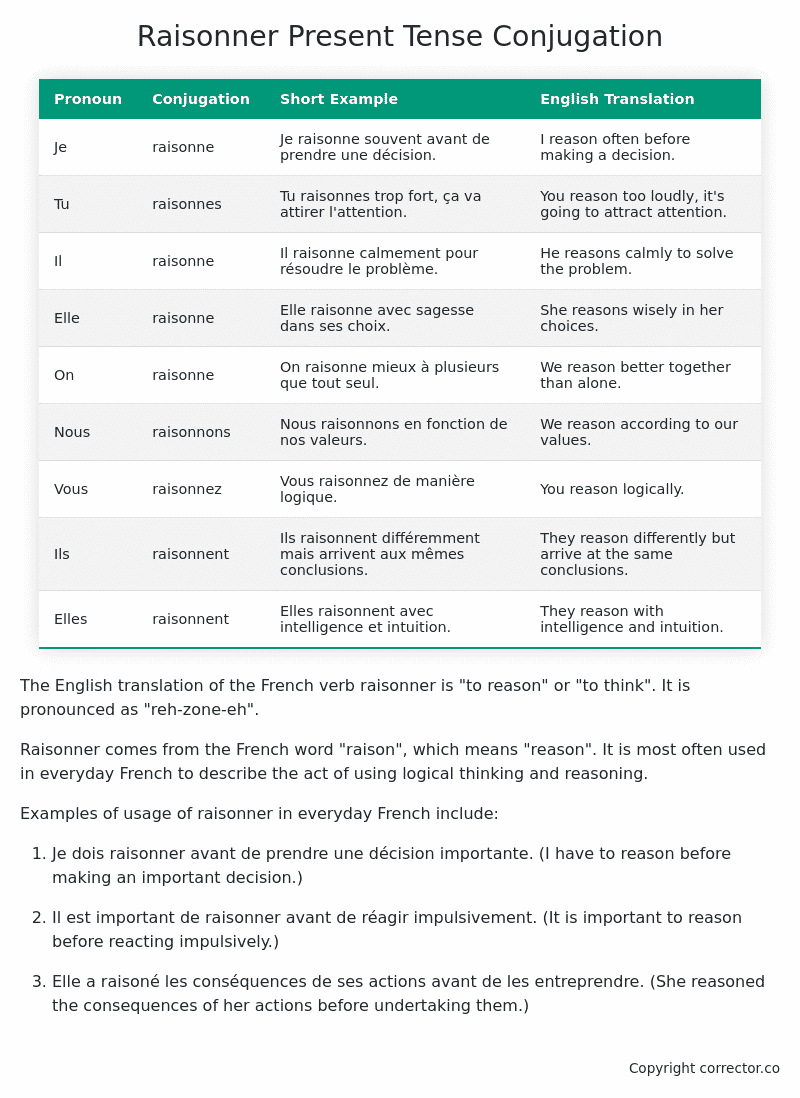Le Present (Present Tense) Conjugation of the French Verb raisonner
Introduction to the verb raisonner
The English translation of the French verb raisonner is “to reason” or “to think”. It is pronounced as “reh-zone-eh”.
Raisonner comes from the French word “raison”, which means “reason”. It is most often used in everyday French to describe the act of using logical thinking and reasoning.
Examples of usage of raisonner in everyday French include:
-
Je dois raisonner avant de prendre une décision importante. (I have to reason before making an important decision.)
-
Il est important de raisonner avant de réagir impulsivement. (It is important to reason before reacting impulsively.)
-
Elle a raisoné les conséquences de ses actions avant de les entreprendre. (She reasoned the consequences of her actions before undertaking them.)
Raisonner – About the French Present Tense
To take a deep dive into all the French tenses then see our article on Mastering French Tense Conjugation.
Common Everyday Usage Patterns For Le Present
Interactions with Other Tenses
Table of the Present Tense Conjugation of raisonner
| Pronoun | Conjugation | Short Example | English Translation |
|---|---|---|---|
| Je | raisonne | Je raisonne souvent avant de prendre une décision. | I reason often before making a decision. |
| Tu | raisonnes | Tu raisonnes trop fort, ça va attirer l’attention. | You reason too loudly, it’s going to attract attention. |
| Il | raisonne | Il raisonne calmement pour résoudre le problème. | He reasons calmly to solve the problem. |
| Elle | raisonne | Elle raisonne avec sagesse dans ses choix. | She reasons wisely in her choices. |
| On | raisonne | On raisonne mieux à plusieurs que tout seul. | We reason better together than alone. |
| Nous | raisonnons | Nous raisonnons en fonction de nos valeurs. | We reason according to our values. |
| Vous | raisonnez | Vous raisonnez de manière logique. | You reason logically. |
| Ils | raisonnent | Ils raisonnent différemment mais arrivent aux mêmes conclusions. | They reason differently but arrive at the same conclusions. |
| Elles | raisonnent | Elles raisonnent avec intelligence et intuition. | They reason with intelligence and intuition. |
Other Conjugations for Raisonner.
Le Present (Present Tense) Conjugation of the French Verb raisonner (this article)
Imparfait (Imperfect) Tense Conjugation of the French Verb raisonner
Passé Simple (Simple Past) Tense Conjugation of the French Verb raisonner
Passé Composé (Present Perfect) Tense Conjugation of the French Verb raisonner
Futur Simple (Simple Future) Tense Conjugation of the French Verb raisonner
Futur Proche (Near Future) Tense Conjugation of the French Verb raisonner
Plus-que-parfait (Pluperfect) Tense Conjugation of the French Verb raisonner
Passé Antérieur (Past Anterior) Tense Conjugation of the French Verb raisonner
Futur Antérieur (Future Anterior) Tense Conjugation of the French Verb raisonner
Subjonctif Présent (Subjunctive Present) Tense Conjugation of the French Verb raisonner
Subjonctif Passé (Subjunctive Past) Tense Conjugation of the French Verb raisonner
Subjonctif Imparfait (Subjunctive Imperfect) Tense Conjugation of the French Verb raisonner
Subjonctif Plus-que-parfait (Subjunctive Pluperfect) Tense Conjugation of the French Verb raisonner
Conditionnel Présent (Conditional Present) Tense Conjugation of the French Verb raisonner
Conditionnel Passé (Conditional Past) Tense Conjugation of the French Verb raisonner
L’impératif Présent (Imperative Present) Tense Conjugation of the French Verb raisonner
L’infinitif Présent (Infinitive Present) Tense Conjugation of the French Verb raisonner
Struggling with French verbs or the language in general? Why not use our free French Grammar Checker – no registration required!
Get a FREE Download Study Sheet of this Conjugation 🔥
Simply right click the image below, click “save image” and get your free reference for the raisonner Present Tense tense conjugation!

I hope you enjoyed this article on the verb raisonner. Still in a learning mood? Check out another TOTALLY random French verb present conjugation!


